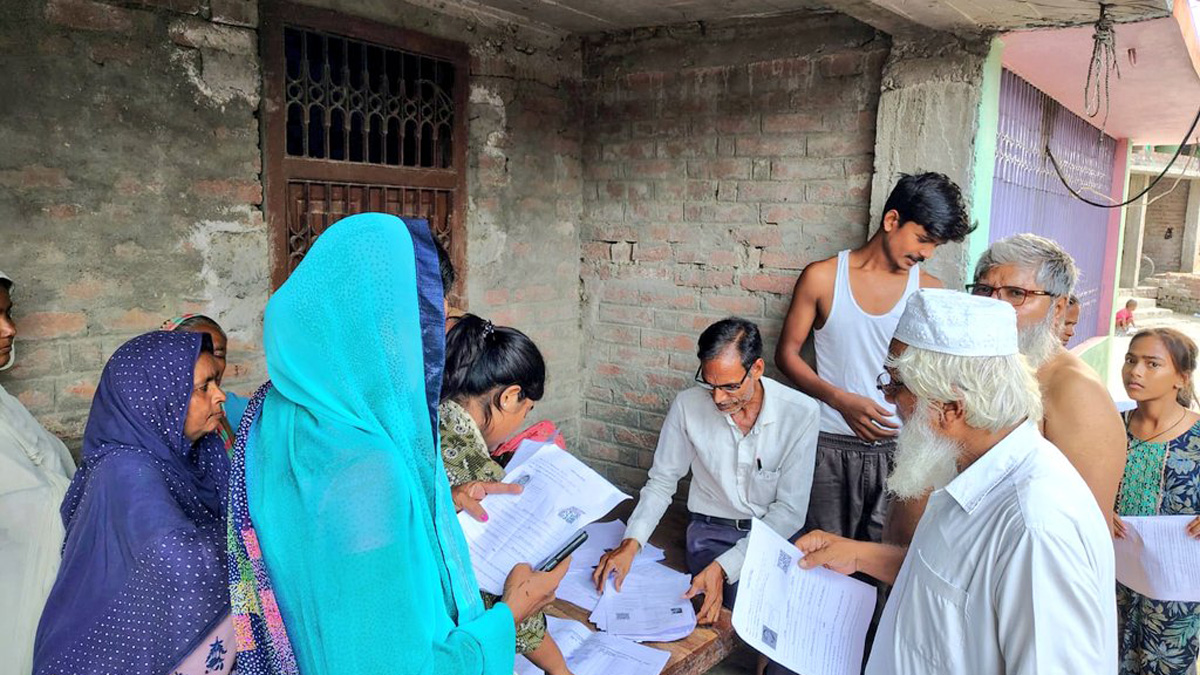SC directs ECI to accept Aadhaar for Bihar SIR, draws clear line between identity and citizenship
 (File) A BLO collecting documents as part of Bihar SIR in Vaishali district, Bihar
(File) A BLO collecting documents as part of Bihar SIR in Vaishali district, Bihar
The Supreme Court on Monday gave a significant push to India’s ongoing electoral roll clean-up by directing that Aadhaar should be treated as a valid proof of identity for the Special Intensive Revision (SIR) of electoral rolls in Bihar. The top court, however, made it clear that Aadhaar was not a proof of citizenship and the ECI is entitled to verify if the documents are genuine.
A bench of Justices Suryakant and Joymlaya Bagchi made it clear that Aadhaar would now be the 12th admissible document alongside 11 others already prescribed by the Election Commission of India (ECI), including passport, ration card, and birth certificate, but not as proof of citizenship.
The Court said categorically that Aadhaar can be used only as proof of identity and residence, not as evidence of citizenship. “Authorities would be entitled to verify the authenticity and genuineness of Aadhaar submitted just like in the case of other documents,” the order stated.
The ECI has been asked to issue instructions during the course of the day and upload the order on its website to ensure compliance across the state. The matter will next be heard on September 15.
Petitioners push for inclusion, ECI resist
Senior advocates Kapil Sibal, Gopal Sankaranarayanan, and Vrinda Grover, appearing for the petitioners, pressed the Court to declare Aadhaar as the 12th document officially recognised for voter roll verification. They argued that Aadhaar is the only document available to the poor and excluding it would amount to disenfranchisement. “All the 11 documents indicated by the ECI, like Aadhaar, are records of identity and residence, not citizenship,” Sankaranarayanan said.
Sibal told the Court that Booth Level Officers (BLOs) had been penalised for accepting Aadhaar despite earlier orders from the Supreme Court permitting its use as an alternative. “We have 24 affidavits from people across districts who were unsuccessful in submitting Aadhaar. Disciplinary proceedings have already started against BLOs who accepted Aadhaar,” he said, pointing to what he described as ground-level resistance within the ECI’s machinery.
Vrinda Grover added a social justice dimension, saying Aadhaar is the only document in possession of many poor citizens, and excluding it would disproportionately impact the vulnerable.
ECI, represented by senior advocate Rakesh Dwivedi, argued that Aadhaar does not have the same legal status as documents like passports, which can also establish citizenship. Dwivedi said that Aadhaar was “not being considered as proof of citizenship” and could at best be a proof of residence. The Commission also claimed that 99 per cent of applicants had already furnished one of the 11 recognised documents, and no political party had reported errors in the exercise so far.
SC draws line between citizenship and identity
The top court carefully drew a distinction between identity and citizenship. Justice Joymalya Bagchi observed that “many of the 11 documents are comprehensive proofs of citizenship. Petitioners are also saying Aadhaar is not a proof of citizenship. Statutorily, Aadhaar is not a proof of citizenship.” Justice Bagchi further noted that Section 23(4) and (5) of the Representation of the People Act does allow Aadhaar to be used as proof of residence.
Justice Kant went a step further, orally observing that while forged Aadhaar or passports may exist, it is ultimately the ECI’s responsibility to verify their genuineness. “Aadhaar is the only document the poor have. They want to remove the poor from the electoral roll,” Grover had argued, to which the judge responded that the duty of verification lies with the Commission.
The Court also reviewed compliance with its earlier directive to appoint paralegal volunteers through the Bihar State Legal Services Authority to assist citizens and political parties in filing claims and objections. Sankaranarayanan pointed out that volunteers had not yet been appointed. Dwivedi countered that this responsibility did not lie with the ECI. The Bench reminded authorities that the exercise must not become exclusionary and directed fresh compliance before the next hearing.
The insistence that Aadhaar’s genuineness be verified like any other document is significant. It implicitly acknowledges concerns about forged Aadhaar cards but shifts the onus squarely onto the ECI’s verification machinery. This could increase the burden on ground officials, but also ensures that blanket exclusion of Aadhaar holders cannot take place.
The next hearing on September 15 will likely test how quickly the ECI translates the Court’s directive into practice. Meanwhile, the nationwide Special Intensive Revision (SIR) exercise, scheduled to begin after the September 10 meeting of the ECI with state Chief Electoral Officers, will be closely watched to see if the Bihar precedent sets the tone across the country.
At stake is not just the integrity of the rolls but also the credibility of an institution that must simultaneously guard against illegal immigrants while ensuring that no legitimate voter is left out.
India